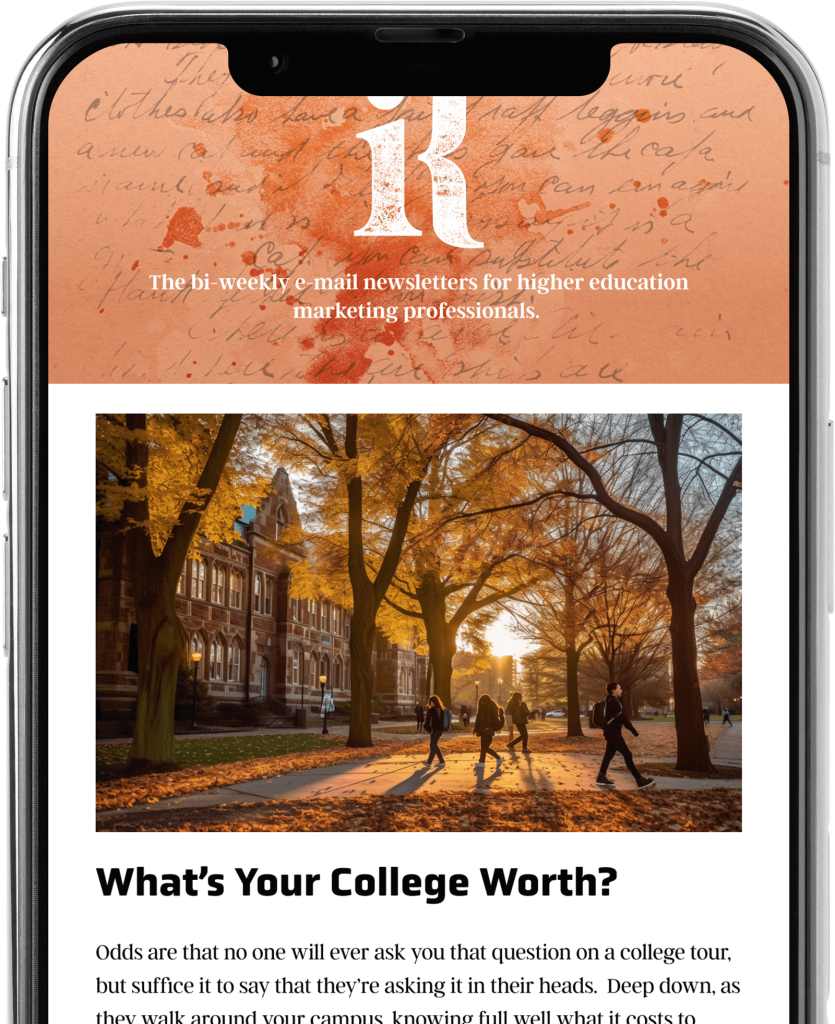Values in Higher Education Marketing
Marketing is About Values

“Marketing is about values.”
—Steve Jobs
When Steve Jobs returned to Apple in 1995 after being fired only a few years earlier from the very company he founded, one of his first tasks was to reinvigorate a brand that, in his view, had been neglected. During his absence, Apple had seemingly lost its way—focusing on selling features, speed, and performance in a sea of competitors doing the same thing. Within months of his return to the company, Jobs delivered a speech to his leadership team that signaled a shift in marketing direction that catapulted the company on a decades-long era of momentum that persists today. In short, his vision was to return the focus of the company’s marketing and messaging to its core values—not products, features, or performance.
Jobs’ legendary speech can be found all over YouTube, in at least one instance dubbed a “masterclass in marketing.” Jobs referred to a noisy world in which the consumer’s attention was so difficult to capture. His proposed remedy was to treat preciously what that consumer would hopefully remember about Apple: what it stands for. Its values. The logic was to steer away from the competitive environment where each PC maker seemed to be selling how fast a computer was and the features of the various operating systems. In the end, Jobs was right. Decades later, hardly anyone talks about how fast the MacBook Pro or how the iPhone has more storage space than the next phone.
Apple resonates with consumers not because of how fast its products are or how well they perform, but because of something deeper. Sure, the computers are fast and effective (we could even argue decidedly faster and more effective than those made by its peers) but everyone says that. Everyone says their products perform well. In that sea of sameness, more of that “same” doesn’t equate in resonance with the consumer. Quite the opposite. It puts that brand in that same sea of sameness—often to never be truly heard from again. That “something deeper” that Apple reaches with consumers is a spirit. That spirit has to do with originality, creative expression and storytelling: an embodiment of a true artist, maker, or innovator. Apple embodies that series of values within its brand. It just so happens that so many of us identify with that same series of aspirations to a point where we not only want to buy and use the products, but wear the Apple logo as a form of expression in and of itself. Apple’s place in the cultural narrative is more about their values of creativity, privacy, and personal empowerment that speed or performance.
Nike, a brand that Jobs also mentions in this speech, is very much the same in that attitude toward embodying values. He points out that Nike really doesn’t sell shoes (a “commodity,” in his words) in its ads, but rather uses the ad space to honor athletic achievement, great athletes, and triumph. If you think about it, you never really hear Nike talking about how great its shoes are or how much better their product is than that of the next guy. Their marketing has succeeded by focusing on values of triumph, determination, effort, discipline, and resiliency. More recently, those values have unapologetically expanded to include social justice, something that has alienated the brand from some while drawing it even closer to others. Just like Apple, Nike knows that talking about features and benefits doesn’t incite passion or make hearts beat fast. Values, on the other hand, has the power to do those very things. So what does this mean for higher education brand-builders? Learn how higher education marketers can leverage core values in their efforts.
Like what you're reading?
Subscribe to our newsletter to get the latest insights in Higher Education and thought leadership.


